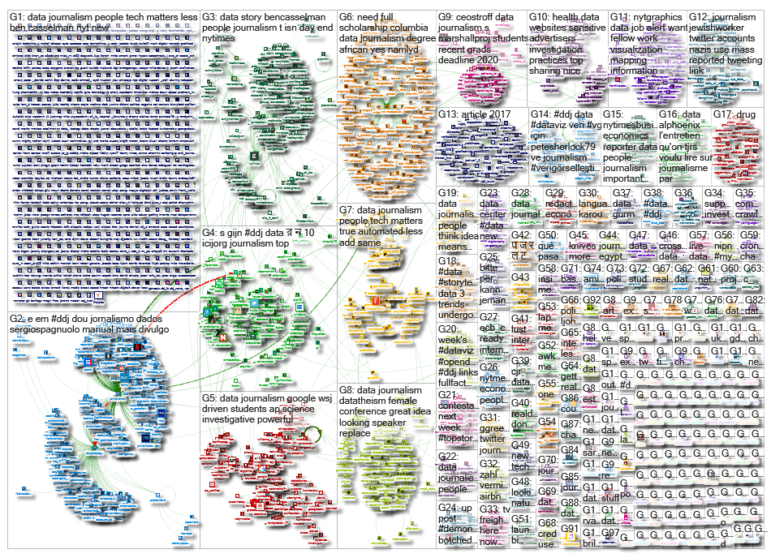What’s the global data journalism community tweeting about this week? Our NodeXL #ddj mapping from November 11 to 17 finds an investigation by The Financial Times uncovering how private health information is traded online by health sites to big advertisers, The Economist looking at the correlation between Americans’ music preferences and political leanings, The Bureau of Investigative Journalism investigating government algorithmic decision-making, and the data community coming together to highlight excellent female data journalists.
Health Data for Sale
Have you ever searched for information related to your health on the internet? The Financial Times’ investigation found that top health websites are sharing people’s most sensitive health data — including symptoms, diagnoses, and period and fertility information — with dozens of companies around the world, including Google, Amazon, and Facebook. Video explainer here.
In GDPR world, this statement should ring alarm bells for any org #privacy "tracker cookies were dropped before consent was given" https://t.co/tJ2ldSLvbX pic.twitter.com/h2IolGkH56
— Sid Shah (@MrSidShah) November 13, 2019
Can Music Taste Help Predict Voting Patterns?
The Economist looks into how Americans’ music preferences correlates to voting patterns by analyzing concert ticket sales data. The analysis suggests that the musical style that best predicts liberalism is hip-hop, while for conservatism, it is country. Data journalist G. Elliot Morris explains the article in this thread.
I grew up reading The Economist in HS and college. It was a thrill to work with the supremely talented @gelliottmorris to explore @VividSeats music data/correlations with voting behavior and to have a small hand in a gorgeous visualization.https://t.co/1vSpLvynZA
— Stephen Spiewak (@Spiewak) November 14, 2019
Algorithmic Accountability
Artificial intelligence, algorithms, machine learning, big data: The UK’s Bureau of Investigative Journalism launched a new project that will investigate all these technologies and how they are used in government decision-making. The team has so far looked into a new algorithmic tool for categorizing prisoners in jails that risks automating and embedding racism in the system, as well as concerns over the lack of transparency in government big data projects.
Important story on algorithms assessing 'risk' in criminal justice system – great work @cr0ft0n & Cansu Safak! So pleased @TBIJ are looking into government use of big data, algorithms, machine learning, AI & other tech in its Decision Machines project https://t.co/WOJRdT09Vw https://t.co/7uSXDEmMyf
— Swee Leng Harris (@SweeLengHarris) November 14, 2019
Analyzing the Global Population
Do you believe that the number of children is increasing worldwide? And do you also think that lesser-developed countries are responsible for an exploding population due to high birth rates? Der Spiegel investigates these common perceptions and explains its findings in numbers and graphics.
My newest article comes with a tribute to @HansRosling @factfulness.https://t.co/nrcID3yKVd
It's an explainer why the world population is still increasing, even though the fertility rate has declined significantly.#ddj #dataviz pic.twitter.com/7ObxG5ulyy
— Patrick Stotz (@PatrickStotz) November 13, 2019
Gender Parity: Women in Data Journalism
We love Twitter for this: Last week, Adam Thomas, director of the European Journalism Centre, learned that a tech industry conference he will keynote had a dismal gender ratio for speakers at 12:1, male to female. He reached out on Twitter for suggestions of women who could replace him to speak on data journalism and artificial intelligence, and the data journalism community responded in spades. The conference will now feature two female keynote speakers and Thomas created a Twitter list from the community’s suggestions.
The conference agreed to host not one, but two female keynotes. @AineKerr and @Maid_Marianne kindly agreed to take the stage. /2
— Adam Thomas (@datatheism) November 15, 2019
Predictive Journalism
In this age of digital media, media outlets now forecast everything from Oscars and elections to house prices and coups d’état. An Economist data journalist warns that predictive journalism is complicated, plagued by bad data, poor modeling, and insufficient communication.
I would be particularly happy if you, the person reading this, would sit down and read my detailed take on how hyper-certain predictive journalism is both dangerous and dishonest, up online today at @datajournalismhttps://t.co/OhJ0O0XO7j. Some lessons familiar and unfamiliar pic.twitter.com/myM8IQ9eNT
— G. Elliott Morris (@gelliottmorris) November 14, 2019
Data Isn’t the Story, People Are
Ben Casselman, an economics reporter at The New York Times, uses R programming language, works with vast data sets, makes charts, and wrangles data on spreadsheets, but he says the most important piece of technology on his desk is the landline telephone. This is because, he explains: “The best stories almost always emerge from talking to people, whether they are experts or just ordinary people affected by the issues we write about.”
Nice read reminding us that data is awesome but real human stories are even better https://t.co/yNkQiyfyP1
— Vesselina Ratcheva (@vessisr) November 18, 2019
Data-Driven Toronto
Canada’s third annual Data Driven conference was held in Toronto last week and there’s a record of the livestream here. It features talks from investigative and data journalists such as David McKie, Valérie Ouellet, Megan Ogilvie, and Theresa Boyle.
Can't make it to #Toronto to hear some of Canada's finest talk about #datajournalism? Don't worry. It's all being streamed. HT @DavidWeisz for organizing an outstanding conference! https://t.co/rzhFBJcN3n
— CAJ Toronto (@TorontoCAJ) November 15, 2019
Big Scholarships for Data Journalism M.A.’s
The Columbia Journalism School awards about US$5 million annually in scholarships for master’s level students, including a US$150,000 Pulitzer Africa Data Journalism Scholarship for residents of Africa, and a US$100,000 Nikkei fellowship for residents of Asia. More details here.
A top-tier journalism education can be within financial reach: depending on the program, 72% to 100% of students who apply for scholarships receive funding, w/median award covering about 50% of tuition & fees. To learn more about scholarships visit: https://t.co/ddCpdXaBDO pic.twitter.com/SJDAok3w1p
— M.A. Columbia Journ (@ColumbiaJournMA) January 7, 2019
Unsuccessful Anti-Migrant Polemics
Spain’s far-right Vox party tried to fan the flames of anti-foreigner sentiments to win votes. But according to Eldiario.es’s analysis, it seems their polemics against migrant children did not succeed in neighborhoods surrounding migrant centers.
La polémica política no se traduce en alarma vecinal: el voto a Vox no despuntó alrededor de centros de menores extranjeros https://t.co/EU1RvC2hsT
👉 En Hortaleza fue tercera fuerza. En la Macarena de Sevilla, tras la visita de Monasterio, cuarta pic.twitter.com/lJBPhsaPv5
— eldiario.es (@eldiarioes) November 16, 2019
Thanks again to Marc Smith of Connected Action for gathering the links and graphing them. The Top Ten #ddj list is curated weekly.
 Eunice Au is GIJN’s program coordinator. Previously, she was a Malaysia correspondent for Singapore’s The Straits Times, and a journalist at the New Straits Times. She has also written for The Sun, Malaysian Today, and Madam Chair.
Eunice Au is GIJN’s program coordinator. Previously, she was a Malaysia correspondent for Singapore’s The Straits Times, and a journalist at the New Straits Times. She has also written for The Sun, Malaysian Today, and Madam Chair.

